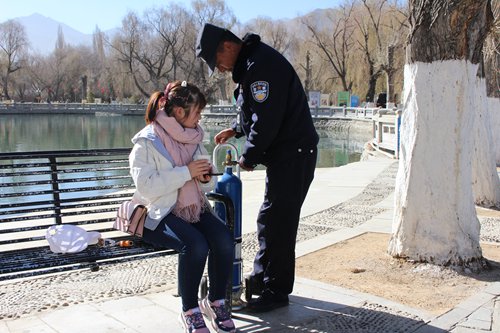
A police officer from the Potala Palace square police service station helps a female tourist with oxygen therapy in Potala Palace square on Wednesday. (Photo: GT)
The 24-hour patrols of some 100 police service stations in Lhasa, capital of Southwest China's Tibet Autonomous Region, has greatly improved the city's peace and stability.
On Wednesday, local Tibetans spun prayer wheels while walking in the Potala Palace square and tourists took photos of the palace and casually sat around. Outside the square is a police service station.
"Not a single criminal case was reported in the palace area in the past eight years, mainly because of the police service station since 2011, which can respond to emergency calls in three minutes," Wang Yongpu, the station chief who has been assigned to the station for seven years, told the Global Times on Wednesday.
Through the surveillance system, 24-hour patrols, security checks and cooperation with traffic departments, police in the service station can prevent criminal crimes, Wang said.
The police service stations are set up in seven cities and prefectures in Tibet. Its functions include patrols, dealing with police calls, offering help to citizens and fire safety management, the Public Security Department of the Tibet Autonomous Region said.
Police patrols on cars, motorcycles and on foot allow police to immediately detect, control and crack down on street crimes, which have effectively maintained security order in key areas, including schools, major public places and government buildings, the public security department said.
Besides maintaining public safety, the stations also provide assistance to residents, such as offering travel advice, medical help and cell phone charging, Wang said.
"Public safety is meant to serve residents, help them solve difficulties and prevent personal injury and damage to their property," Wang said.
The walls of the station are covered with silk banners given by residents across the country to show their gratitude for their kindness and thoughtfulness.
A sense of security and satisfaction among Tibetan residents surpassed 99 percent in 2018, according to the 2019 Tibet government work report released in January.
Lhasa ranked first among 38 major Chinese cities in public safety, a blue book published by the Chinese Academy of Social Sciences on public services in Chinese cities showed, the Tibetan Daily reported in February.
Many local Tibetans and tourists from other parts of the country lined up outside the iconic Potala Palace in order on Wednesday, and several Tibetan residents told the Global Times that they feel much safer than 10 years ago.
A tourist surnamed Li from Wuhan, Central China's Hubei Province, told the Global Times that his two-day stay in Lhasa has dispelled previous concerns over security.
"The local people are so friendly to me, and I even had walks at night with frequent police patrols," Li said.
Tourists said that they were pleased to cooperate with police in security and ID checks outside the Potala Palace, as what police did was to ensure their safety.


